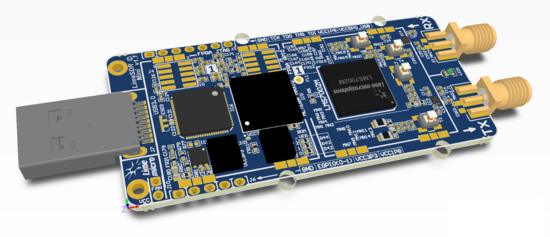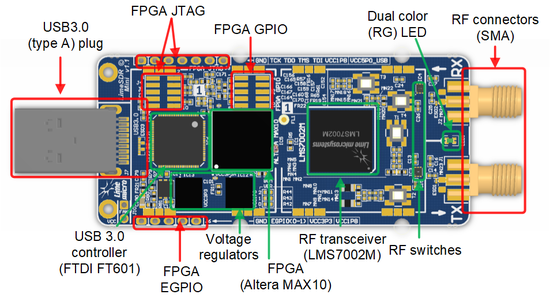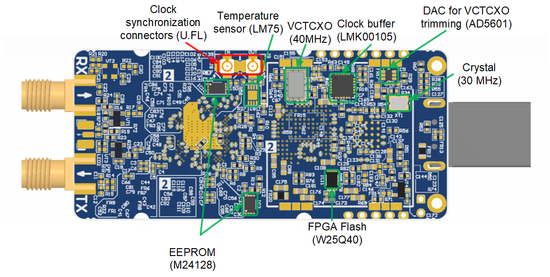LimeSDR-Mini v1.1 hardware description
LimeSDR-Mini Board Key Features
The LimeSDR-Mini is low-cost software defined radio board. LimeSDR-Mini development board provides a hardware platform for developing and prototyping high-performance and logic-intensive digital and RF designs using Intel’s MAX 10 FPGA and Lime Microsystems transceiver.

LimeSDR-Mini board features:
- USB 3.0 controller: FTDI FT601
- FPGA: Intel MAX 10 (10M16SAU169C8G 169-UBGA)
- 169-pin FBGA package
- 16 K LE
- 549 Kb M9K Memory
- 2368 Kb User Flash Memory
- 1x fractional phase locked loops (PLLs)
- 45x 18x18-bit multipliers
- 130x general purpose input/output (GPIO)
- Single supply
- Flash feature
- FPGA configuration via JTAG
- RF transceiver: Lime Microsystems LMS7002M
- EEPROM Memory: 2x 128Kb EEPROMs for LMS MCU firmware and FPGA data
- FLASH Memory: 4Mb Flash memory for FPGA data
- Temperature sensor (unpopulated)
- General user inputs/outputs:
- 1x Dual colour (RG) LED
- 8x + 2x FPGA GPIO pinheader (3.3V)
- Connections:
- USB3.0 (type A) plug
- Coaxial RF (SMA female) connectors
- FPGA GPIO headers (unpopulated)
- FPGA JTAG connector (unpopulated)
- FAN (5V or 3.3V) connector
- Clock system:
- 40.00MHz onboard VCTCXO
- Possibility to trim VCTCXO by onboard DAC
- Reference clock input and output connectors (U.FL)
- Board size: 69mm x 31.4mm
For more information on the following topics, refer to the respective documents:
- FTDI FT601 USB 3.0 to FIFO Bridge datasheet [link]
- MAX 10 FPGA device family, refer to MAX 10 Device Handbook [link]
- LMS7002M transceiver resources [link]
Board Overview
This section contains component location description on the board. LimeSDR-Mini board picture with highlighted connectors and main components is presented in Figure 2 and Figure 3.


Board components description listed in the Table 1 and Table 2.
| Featured Devices | ||
|---|---|---|
| Board reference | Type | Description |
| IC1 | FPRF | Field programmable RF transceiver, LMS7002M |
| IC5 | FPGA | Intel MAX 10 (10M16SAU169C8G 169-UBGA) |
| IC6 | USB 3.0 microcontroller | Intel MAX 10 (10M16SAU169C8G 169-UBGA) |
| Miscellaneous devices onboard | ||
| IC9 | IC | Quad SPDT switch, TS3A5018PW |
| IC6 | IC | Temperature sensor, LM75 |
| IC19 | IC | SPI to I²C bridge, SC18IS602BIPW (not mounted) |
| IC17 | IC | I²C port expander with 4 push-pull outputs and 4 inputs, MAX7322ATE+ |
| Configuration, Status and Setup Components | ||
| IC9 | IC | Quad SPDT switch, TS3A5018PW |
| R51, R52, R53, R54, R56, R57, R59, R60 | 0 Ohm resistor | FPGA (IC31) MSEL[3:0]. Default mode: Active Serial Standard configuration |
| R115, R116, R117 | 10 kOhm resistor | USB3.0 microcontroller (IC13) boot configuration (PMODE0[2:0]) resistors. Default mode: SPI boot, On Failure - USB Boot |
| R125, R127, R128 | 10 kOhm resistor | USB3.0 microcontroller (IC13) crystal/clock frequency selection (FSLC[2:0]) resistors. Default mode: 19.2MHz crystal |
| J16 | JTAG chain pin header | USB3.0 (IC6) microcontroller’s debugging pin header, 0.05” pitch |
| J17, R122 | Pin header | USB3.0 microcontroller boot source (Flash memory or USB), 0.05” pitch jumper or 0402 0R resistor. In normal operation jumper or resistor must be placed. |
| SW1 | Push-button | USB3.0 microcontroller reset button |
| J11 | JTAG chain pin header | FPGA programming pin header for Altera USB-Blaster download cable, 0.05” pitch |
| LEDS1 | Red-green status LEDs | User defined FPGA indication LED1 (near board edge if SMD; on the bottom if through-hole), User defined FPGA indication LED2 (farther board edge if SMD; on the top if through-hole) |
| LEDS2 | Red-green status LEDs | FX3 (USB) status indication LED (near board edge if SMD; on the bottom if through-hole), board power indication LED (farther board edge if SMD; on the top if through-hole) |
| General User Input/Output | ||
| J12 | Pin header | 8 FPGA GPIOs, 0.05” pitch |
| J13, J14 | Pin header | 3.3V fan connection pin headers, 0.1” and 0.05” pitch respectively |